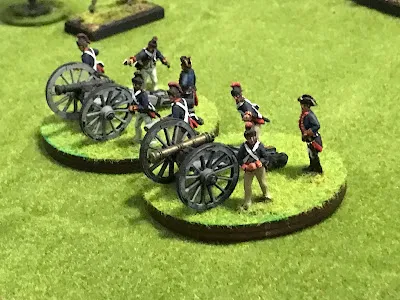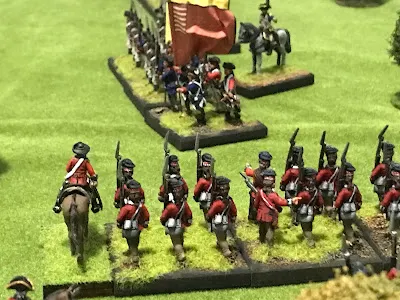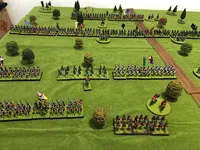I found this account in the Allen French papers, donated to Minute Man NHP. There are a number of letters from Souter including notes and transcriptions from French. He obtained these from a Rev. Hint of Cornwall England. These were not used in either of his books "Day of Lexington and Concord" or "General Gage's Informers." Possibly they were obtained after they were published. The letter posted here has very good information which adds a lot to our understanding of the days events. He described the formations the company marched in. And he also describes flanking on the march back.
"On Tuesday ye 18th instance about ten in the evening the light infantry and Grenadiers of the army had orders to push to Concord, a village about twenty miles from this place, in order to destroy a magazine of powder, cannon, carriages and other military stores which had been laid up, (for a supposed campaign) by the Americans. We marched all night without molestation and about daylight in marching through a village called Lexington, the van company of the light troops was staggered by seeing a flash of a pan from a man in arms, and soon after a report and whistling of two balls fired on it...
...in which the light company pushed forward and saw a dozen or eighteen men drawn up with arms, the light companies in hearing a shout from the leading company, immediately formed and a fire was given in their running off which killed most of them; for my part I was amazed when I heard the shout, and being the third company that lead in the front, took it for granted we were surprised, not imagining in the least that we should be attacked or evan molested on the march, for we had but that instant loaded and had marched all night without being loaded.
...the country by this time took ye alarm and were immediately in arms, and had taken their different stations behind walls and etc on our flanks, and thus were we harrassed in our front, flanks and rear from Concord to Charlestown (a place in the other side of the river opposition Boston) by a continual fire for eighteen miles, it not being possible for us to meet a man otherwise than behind a bush, stone hedge, or tree who immediately gave his fire and off he went; our companies were not able to march more then half of its front on the open road, or more properly speaking, in two platoons, the second in the rear of the first. In our leaving Concord we were immediately surrounded on every quarter, and expected to be cut off every moment, sometimes we took possession of one hill sometimes of another; at last it was determined to push forward to Lexington, which we did though a plaugy fire...
...When we were joined by Lord Percy with the first brigade with four pieces of cannon, otherwise I do believe not one of us had got into Boston again; as it was the fire did not cease till we reached Charlestown; and our battalion lost sixty killed, wounded and missing, it falling heavy on us; our Light Infantry and Grenadiers having nearly expended all their ammunition, and they were obliged to cover our retreat. There are many killed and wounded on both sides on ours eight or ten officers and 260 privates. I imagine on theirs the report four or five hundred - I accidentally was wounded in my leg flanking the Brigade with my company in ye woods, by a villain behind a stone wall who waited till he was sure of me, and then to the right about and off he went, not before I have him my gun, but missed him; one of my men I think brought him down. The ball just grazed the bone but has not shattered it in the least, as I was able to walk eight or ten miles after it; I mention this that your sister may not in the least be worried by imagining there is any danger as I shall be able to walk in a day or two, and I am now as well as ever almost. I am thus particular that no report may be credited, as many will be that are sent hence to England, and that the return of the killed wounded and missing, and etc. If ye officers may possibly be badly ascertained, I think it right to be ingenious and hope a day of reckoning will come,when ample satisfaction will be given me, for a sound re urged by a rebel' s hand. It is a flesh wound only and thankful I am to the great almighty it no worse. "
There are lots of little snippets here that deserve attention. I think this is the only mention I have found of a officer in flanking duty. Also that in the six detached light infantry companies heading towards Lexington green the marines were the third from the van. So the first three companies were the 10th, 4th and Marines. Most importantly he describes the march formation for companies. Two platoons or half companies. This makes the command form much more understandable. In Howe's light infantry discipline this was his you got columns or files to form a company front. Most interesting!
Should anyone like to use this please credit my post here. I would appreciate it.

.jpeg)
.jpeg)



.jpg)

.jpg)
.jpg)






























